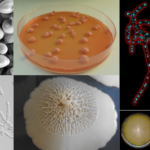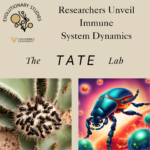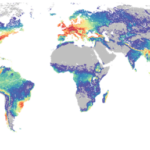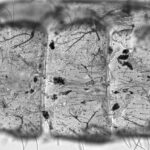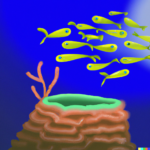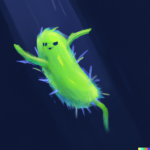biological sciences
Analyzing Evolutionary Trade-Offs in Immune Systems: Computational Biology with Reese Martin
Jul. 22, 2024—By Nick McCoy, Evolutionary Studies undergraduate communications assistant Reese Martin has always been drawn to biology and exploring the behaviors of different organisms. During his childhood, he dug in anthills, and now he observes the life history traits of flower beetles and other taxa. Martin’s new first-author paper, “Pleiotropy Alleviates the Fitness Costs Associated With...
Graduate Student Uncovers New Galactose Assimilation Pathway
Apr. 26, 2024—By: Andy Flick Evolutionary Studies Scientific Coordinator Not to be outdone by her significant contributions to a study that appeared in April 25’s Science magazine, Marie-Claire Harrison, a graduate student in the Rokas Lab, published a first-author article in the journal Proceedings of the National Academy of Sciences the very next day titled “Machine learning...
Vanderbilt Researchers Flip the Script on Yeast Ecological Diversity
Apr. 25, 2024—By: Andy Flick, Evolutionary Studies scientific coordinator A mere decade or two ago, decoding the genome of every organism in a major branch of the tree of life and deciphering their diets was a pipedream. In a groundbreaking study, a team of researchers from Vanderbilt University, the University of Wisconsin-Madison, and other institutions worldwide have...
Beckman Scholar Charu Balamurugan Unveils Evolutionary Insights into Penicillium Secondary Metabolites
Mar. 26, 2024—By: Andy Flick, Evolutionary Studies Scientific Coordinator Beckman Scholar Charu Balamurugan, an undergraduate researcher in the Rokas lab at Vanderbilt University, has shed light on the intricate evolutionary patterns governing secondary metabolite biosynthesis in fungi. Working with former Ph.D. student Jacob Steenwyk, lab PI Antonis Rokas, and collaborator and Global Scholars Program participant Gustavo Goldman,...
Insect Immune Insights: Researchers Unveil Immune System Dynamics
Mar. 12, 2024—By Andy Flick, Evolutionary Studies scientific coordinator Justin Critchlow, a recent Ph.D. student in Ann Tate’s lab, just published a paper with the labmates Arun Prakash (postdoctoral researcher), Katherine Zhong (former undergraduate), and Tate, uncovering the intricacies of beetle immune dynamics. The paper was just published in PLoS Pathogens, “Mapping the functional form of the...
Breaking the Mold: Kyle David’s Research Challenges Ecological Norms in Yeast Communities
Feb. 27, 2024—By: Andy Flick, Evolutionary Studies scientific coordinator Kyle David, an NSF postdoctoral fellow in the Rokas lab, and co-authors published a new paper, “Saccharomycotina yeasts defy longstanding macroecological patterns” in the high-impact journal PNAS. This paper, which looks at the ecology of 186 species of yeast, provides evidence that not all life-forms follow the rules....
Vanderbilt University biologists discover that rising temperature accelerates aging in mosquitoes, weakening their immune system
Jan. 25, 2024—By Sarah Ward, Evolutionary Studies graduate communications assistant Climate change may weaken mosquitoes by speeding up aging and slowing down their immune system. A study published January 10, 2024 in PLOS Pathogens by Vanderbilt biology graduate student Lindsay Martin and Centennial Professor of Biological Sciences Julián Hillyer found that mosquitoes age more quickly when temperatures...
Vanderbilt Postdoctoral Researcher Reveals Genomic Secrets of Ocean Sponges
Dec. 4, 2023—By: Sarah Ward Evolutionary Studies graduate communications assistant Picture a thriving marine environment. Perhaps you envision a community as colorful and lively as “Finding Nemo,” where massive schools of fish are flanked by sharks and sea turtles. What about sponges? While perhaps less popular than their flamboyant counterparts, these organisms are the foundation of life...
Researchers Reveal Insights into Bacterial Genome Evolution
Oct. 15, 2023—By Andy Flick, Evolutionary Studies Scientific Coordinator In a new study led by graduate student Carl Stone and his advisor, assistant professor of biological sciences, Megan Behringer, the team studied the effects of DNA repair pathways on genome-wide methylated DNA adenines (6mA). 6mA is a modification to DNA such that a methyl group is added...
Vanderbilt Researcher Illuminates the Impact of Sunlight on Eye Function
Sep. 22, 2023—By: Andy Flick, Evolutionary Studies scientific coordinator A recent study by assistant professor of biology and ophthalmology Gianni Castiglione illuminates our understanding of eye diseases like macular degeneration. The paper, Convergent evolution of dim light vision in owls and deep-diving whales, was published in “Current Biology.” Rhodopsin (RHO), a light-sensitive protein found in the rod...


